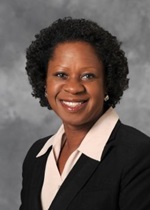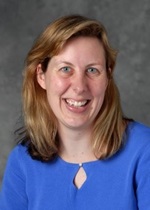Meet the
Generation Health Research Study Team
What does an Epidemiologist do?
An epidemiologist studies patterns and causes of diseases within groups of people. Their goal is to develop strategies to prevent or control disease and improve public health. Epidemiologists perform research, community education and lead health policy initiatives.
 Christine Joseph, Ph.D., Lead Investigator
Christine Joseph, Ph.D., Lead Investigator
Dr. Joseph is a Senior Epidemiologist in the Department of Public Health Sciences and is the Co-lead Investigator for the Generation Health study. As a researcher, she has a special interest in health disparities and social determinants of health. “We hope mothers will consider taking part in this important study to quantify the connection between where mothers have lived and the adult health of their children,” says Dr. Joseph. “We know that our environment and lived experiences affect our health as individuals. With this study we will explore how the lived experience of one parent can impact the health of the next generation. This would have huge implications for improving the health of communities. It’s incredibly meaningful and could help us understand more about how we can improve health and wellness for all people in the generations to come.”
 Ganesa R. Wegienka, Ph.D., Co-principal Investigator
Ganesa R. Wegienka, Ph.D., Co-principal Investigator
Dr. Wegienka is an Epidemiologist and a Senior Scientist in the Department of Public Health Sciences. In addition to co-leading the Generation Health research team, she leads the ALOFT and SELF studies at Henry Ford Health. Dr. Wegienka says, “We must understand how our health is influenced by the experiences of our mothers before we are even born. Generation Health is a unique way to do this.”
 Denise White-Perkins, M.D., Ph.D.
Denise White-Perkins, M.D., Ph.D.
Dr. White-Perkins is Chair of the Department of Family Medicine at Henry Ford Health and an investigator for the Generation Health study. A native Detroiter, she has devoted her career as a family physician, medical educator, researcher and health system leader to health equity. “The Generation Health study will help us understand how a person’s environment – the area where they grew up – can affect their health and the health of their children. I am particularly excited about this study because we are looking at the potential intergenerational impact of residential segregation – a social inequity which can mediate exposure to key social determinants of health, including education, income, employment, and housing.”
 Araba Gyan, MPH, Study Coordinator
Araba Gyan, MPH, Study Coordinator
As Study Coordinator, Araba Gyan is the first contact for families participating in the Generation Health study. She is available to answer questions, follows up with mothers about their blood samples and assists participants with payment. She began working on the Generation Health study together with Christine Joseph, Ph.D., during her internship with the Department of Public Health Sciences at Henry Ford.
"Until now, researchers haven’t investigated a mother’s environment growing up and connected it to her child’s health, and this new research has exciting potential for discovery,” says Gyan. “Through our work, we are also bringing attention to structural racism, health disparities and neighborhood discrimination that has been part of Detroit-area communities for many years,” she says. Gyan has a master’s degree in public health from the University of Michigan – Ann Arbor.
.svg?iar=0&hash=F6049510E33E4E6D8196C26CCC0A64A4)

/hfh-logo-main--white.svg?iar=0&hash=ED491CBFADFB7670FAE94559C98D7798)